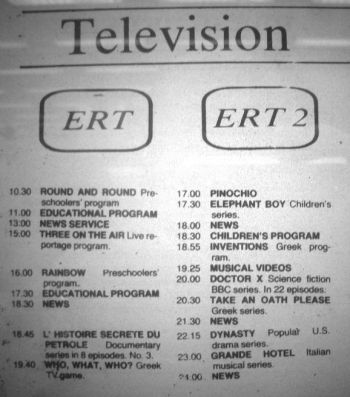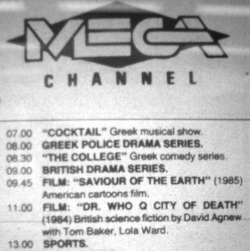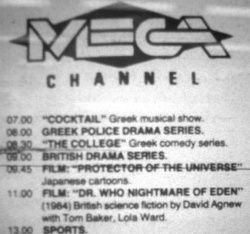Difference between revisions of "Greece"
Jon Preddle (talk | contribs) |
Jon Preddle (talk | contribs) |
||
| Line 72: | Line 72: | ||
|- | |- | ||
|} | |} | ||
| + | |||
| + | This selection of serials is the same as the group that was sold that same year to [[France]] (although the French sale included one more story: [[Planet of Evil]]), while three of them were also sold to [[Yugoslavia]]; it's unlikely to be a coincidence, so presumably the rights on the stories first sold to France were extended partially to cover sales to other countries within Europe. | ||
| + | |||
| + | Since ERT broadcast in English, they would not have received the same "music/effects" tapes that were supplied to TF1 for dubbing into French. | ||
| Line 143: | Line 147: | ||
It's not known if MEGA played any of the same serials that ERT-2-TV had aired. | It's not known if MEGA played any of the same serials that ERT-2-TV had aired. | ||
| − | After a two month break, the series returned for nine weeks, from Saturday, '''6 July 1991''', with a two hour timeslot running from 11.00am to 13.00pm for the first four, then a 90 minute slot of 9.45am to 11.15am for the remaining five. These were all omnibus editions, the first of which was [[City of Death]], followed by [[Nightmare of Eden]] on '''13 July'''. The other seven weeks/stories are not named. They would all have been 4-parters to account for regular | + | After a two month break, the series returned for nine weeks, from Saturday, '''6 July 1991''', with a two hour timeslot running from 11.00am to 13.00pm for the first four, then a 90 minute slot of 9.45am to 11.15am for the remaining five. These were all omnibus editions, the first of which was [[City of Death]], followed by [[Nightmare of Eden]] on '''13 July'''. The other seven weeks/stories are not named. They would all have been 4-parters to account for the regular 90 minute timeslot. It is likely they were the same eight stories that screened episodically in 1990, with the addition of a ninth (unidentified) story, or possibly a repeat or rescheduled pre-emption of one of the others. |
This run ended on '''31 August 1991'''. | This run ended on '''31 August 1991'''. | ||
Revision as of 22:16, 26 July 2020
GREECE is a south European country on the Mediterranean Sea.
Profile
| Country Number (NK) | 1986 | THIRD WAVE |
| Region | Europe | |
| Television commenced | 1966 | |
| Colour System | 1976 | SECAM/PAL |
| Population | 1987 | 9.9 million |
| TV Sets | 1987 | 1.725 million |
| Language/s | Greek | English |
Television Stations / Channels
Doctor Who aired on two different TV stations in Greece:
- Elliniki Radiophonia Tileorassi (ERT-2-TV, Channels 5,8,30)
ERT broadcast in the SECAM colour system.
and
- Mega Channel (MEGA 2)
MEGA broadcast in the PAL colour system.
DOCTOR WHO IN GREECE
Greece was the eighth country in Europe to screen the series.
BBC Records
The Eighties - THE LOST CHAPTERS records a sale of "(5)" stories by 10 February 1987. These would be for the five sold to ERT-2.
Greece is not identified in any of the DWM story Archives.
Stories bought and broadcast
TOM BAKER
Two separate runs of Tom Baker stories aired – the first from 1986 to 1987, the other 1990 and 1991.
The first consisted of 22 episodes, and from anecdotal evidence is believed to have included the following stories from GROUP A and GROUP B of the Tom Baker stories:
Five stories, 22 episodes
| 4A | Robot | 4 |
| 4C | The Ark in Space | 4 |
| 4D | Revenge of the Cybermen | 4 |
| 4E | Genesis of the Daleks | 6 |
| 4F | Terror of the Zygons | 4 |
This selection of serials is the same as the group that was sold that same year to France (although the French sale included one more story: Planet of Evil), while three of them were also sold to Yugoslavia; it's unlikely to be a coincidence, so presumably the rights on the stories first sold to France were extended partially to cover sales to other countries within Europe.
Since ERT broadcast in English, they would not have received the same "music/effects" tapes that were supplied to TF1 for dubbing into French.
The two MEGA CHANNEL runs included at least two stories from season 17, with others believed to be from seasons 13 and 16.
Anecdotal evidence indicates that it was these eight stories, 32 episodes:
| unidentified 4-parter | 4 | |
| 4K | The Brain of Morbius | 4 |
| 5A | The Ribos Operation | 4 |
| 5B | The Pirate Planet | 4 |
| 5C | The Stones of Blood | 4 |
| 5H | City of Death | 4 |
| 5K | Nightmare of Eden | 4 |
| 5L | The Horns of Nimon | 4 |
The programme was supplied as PAL colour video tapes with the original English soundtracks. (It appears that the ABC in Australia sent to "Athens" copies of The Brain of Morbius in 1990.)
City of Death and Nightmare of Eden were later edited into omnibus editions in 1991. Presumably the other seven 1991 omnibuses were re-edits of the other six listed here, plus one other.
That these screenings carried a "(1984)" copyright date on them (see below) it's possible these were PAL or SECAM conversions taken from the Lionheart NTSC master tapes created for the US market, which also often display a "1984" or "1985" copyright date.
SYLVESTER McCOY
PAUL McGANN
TV Movie, 84 minutes:
| TVM | The TV Movie | 1 |
Transmission
TOM BAKER
ERT-2-TV commenced its 22-episode run of Doctor Who from Friday, 5 December 1986, at 8.00pm.
None of the billings had story titles, so it is unclear what aired, but to account for the "(5)" stories recorded as being sold, a 22-episode run would consist of one 6-parter and four 4-parters. Alternatively, 22 consists of five 4-parters and a single 2-parter, but that would be a total of 6 stories.
According to the listings (see below), no episode aired on 6 February or 17 April (due to it being Easter). However that accounts for only 21 episodes. It is likely that the listing for 6 February was incorrect.
This run ended on 8 May 1987.
Three and a half years later, from Sunday, 7 October 1990, Doctor Who returned to Greece TV, this time on the MEGA CHANNEL channel 2 (which was launched on 20 November 1989).
The first four episodes aired at 4.00pm; the series moved to the earlier slot of 12.30pm for the fifth episode, then 11.30am for the next 11 weeks. From 27 January 1991, the timeslot moved back to 12.30pm. There was no episode on 7 April 1991, to allow for special Easter programming.
The final two listings (1 and 8 May 1991) both have longer timeslots – 12.00 to 12.45pm, and 12.00 to 1.00pm respectively – which might indicate double episodes. If so, then 31, 32 or 33 episodes aired in this run. We think it's more likely to be an even number, as there are no odd-numbered Tom Baker stories.
If it's 32, then that allows for eight 4-parters.
It's not known if MEGA played any of the same serials that ERT-2-TV had aired.
After a two month break, the series returned for nine weeks, from Saturday, 6 July 1991, with a two hour timeslot running from 11.00am to 13.00pm for the first four, then a 90 minute slot of 9.45am to 11.15am for the remaining five. These were all omnibus editions, the first of which was City of Death, followed by Nightmare of Eden on 13 July. The other seven weeks/stories are not named. They would all have been 4-parters to account for the regular 90 minute timeslot. It is likely they were the same eight stories that screened episodically in 1990, with the addition of a ninth (unidentified) story, or possibly a repeat or rescheduled pre-emption of one of the others.
This run ended on 31 August 1991.
PAUL McGANN
The 1996 TV Movie aired on ERT in late 1996/early 1997.
There is no clear record that Greece aired Doctor Who again.
TV listings
| ← AIRDATES ...... (CLICK ICON TO GO TO TABLE SHOWING EPISODE BREAKDOWN AND AIRDATES - N/S = story title is Not Stated) |
TV listings are from the Athens News, an English language newspaper.
The first listing gives the title as "DOCTOR X", an error also repeated on the 2 and 9 January 1991 listings. The billing goes on to describe the series as being a "Science fiction BBC series. In 22 episodes." No story titles are given.
With the switch to the MEGA CHANNEL, the listings change; there are still no story titles given, but the listings describe the series as being a "British science fiction series".
For the 1991 omnibus editions, the listings give the titles for the first two of these only, with the description: "FILM: "DR WHO Q CITY OF DEATH" (1984) British science fiction by David Agnew with Tom Baker, Lola Ward". The miss-spelling of Lalla Ward's name and the stray letter Q aside, it is curious to see the date of (1984) given for this 1979 serial. (Is 1984 a reflection of when these compilations were supplied? Are they NTSC to PAL/SECAM conversions from the mid-80s United States compilations?)
The billing for the next "FILM", Nightmare of Eden repeated the date, author credit and actors' names.
The 20 July billing just had "FILM: "DR WHO" (1984)", with the same (but incorrect) author and cast credit without a story title to identify what it was. The next six billings just said FILM: "DR WHO" (1984)" without any additional credits.
Videos
The two Peter Cushing Dalek movies were released on video in Greece:
- O Dr. Who kai oi Dalekoi
- Oi Iptamenoi Diskoi Epitithentai, later reissued as Daleks: Eisvoli Sti Gi
Greece in Doctor Who
- Alexander the Great is mentioned in Marco Polo, Robot and Genesis of the Daleks
- The Greek philosopher Pyrrho is named in The Keys of Marinus
- The legend of Theseus, the labyrinth and the Minotaur are alluded to in The Space Museum, The Creature from the Pit, The Horns of Nimon
- The Greek army attacks the city of Troy in The Myth Makers
- Atlantis appears or is mentioned in The Underwater Menace, The Daemons and The Time Monster
- Chameleon Tours fly to Athens (The Faceless Ones)
- The Doctor names the three humanised Daleks Alpha, Beta and Omega (The Evil of the Daleks)
- The Doctor refers to The Omega Factor in The Ice Warriors
- Wheel crewmember Kemel Rudkin hails from Greece (The Wheel in Space)
- Medusa, the Minotaur, and a book called "Legends of Ancient Greece" appear in The Mind Robber; also mentioned is Perseus
- There is a T-Mat terminal in Athens (The Seeds of Death)
- There is a Greek War Zone in The War Games
- Solar flare activity is monitored from Athens (The Ambassadors of Death)
- Professor Thascales (the Master) hails from Athens University (The Time Monster)
- Omega appears in The Three Doctors and Arc of Infinity
- Archimedes is mentioned in Planet of the Spiders
- The legend of Jason and the Golden Fleece are alluded to in Underworld
- The Doctor's nickname at school was Theta Sigma (The Armageddon Factor, The Happiness Patrol)
- Ancient Greeks and Athens are mentioned by Mena (The Leisure Hive)
- Bigon the Athenian and fellow his Athenians are on board Monarch's ship. Tegan mentions Corfu (Four to Doomsday)
- Critas the Greek participates in the race for Enlightenment
- Hephaestus, the Greek god of Fire; Poseidon, the Greek god of the sea; the Marine Venus of Rhodes; a kouros statue and art works by a student of Praxiteles are mentioned in Planet of Fire
- Hypatia is one of the Rani's abductees in Time and the Rani
- Greek philosopher Plato is mentioned in Dragonfire
- The Hand of Omega features in Remembrance of the Daleks




